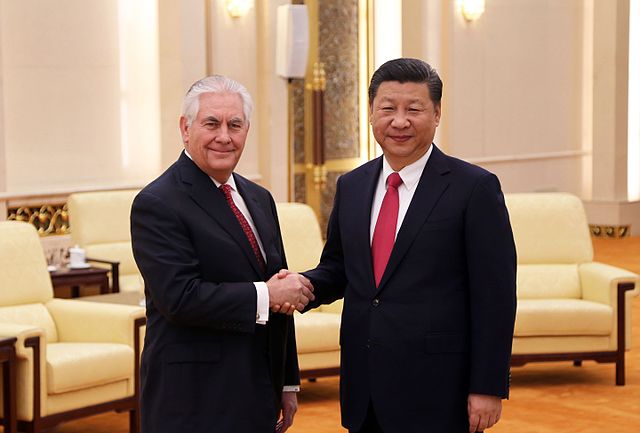With the Presidency in Turmoil, Congress Will Have to Guide U.S. Taiwan Policy
Political turmoil in Washington D.C. does not only result in overworking certain Lawfare editors, it also causes much anxiety in foreign capitals that implicitly or explicitly depend on the U.S. for security. During my recent trip to one of those foreign capitals, Taipei, it was hard not to sense this concern there about the stability of the new U.S. administration.

Published by The Lawfare Institute
in Cooperation With

Political turmoil in Washington D.C. does not only result in overworking certain Lawfare editors, it also causes much anxiety in foreign capitals that implicitly or explicitly depend on the U.S. for security. During my recent trip to one of those foreign capitals, Taipei, it was hard not to sense this concern there about the stability of the new U.S. administration. This week’s events will only make it more likely that the Trump Administration may never get around to developing its own policy on Taiwan (or nominate staff to implement that policy). Luckily, in the case of Taiwan, the U.S. can probably get by for a while without a focused president as long as Congress is willing to step up to the plate.
In most areas of foreign policy, Congress is weak because the statements of individual members do not necessarily reflect the views of the institution as a whole. But in contrast with other areas of foreign policy, Congress as a whole (and the president) have set forth a fairly detailed and authoritative statement of policy in the Taiwan Relations Act. Enacted in the wake of the U.S. decision to normalize relations with China in 1979, the TRA has successfully guided U.S. Taiwan policy for nearly 40 years. So it is worth reviewing its key provisions to recall what U.S. policy on Taiwan is, even if the currently distracted and understaffed Trump Administration never comes up with one.
Section 2(4) of the TRA states that “[i]t is the policy of the United States—to consider any effort to determine the future of Taiwan by other than peaceful means, including by boycotts or embargoes, a threat to the peace and security of the Western Pacific area and of grave concern to the United States.”
The words “threat to the peace and security” echo language in the U.N. Charter authorizing action by the Security Council to respond to threats to “international peace and security.” As for “grave concern,” the U.S. government is “concerned” about lots of things, but it usually only has “grave” concerns when the U.S. might actually have to take some action. So both phrases are intended to signal that the U.S. government would treat any non-peaceful Chinese action against Taiwan, including a boycott or embargo, as a matter that would justify international and U.S. action in response.
This may not seem like much, but because China technically considers Taiwan a purely “internal affair” and insists other nations do the same, this language should remind China (and the U.S. bureaucracy) that non-peaceful measures against Taiwan will trigger U.S. action.
Section 2(5) then goes on to state that the U.S. will provide Taiwan with “arms of a defensive character” and section 2(6) states that the U.S. will “maintain the capacity of the United States to resist any resort to force or other forms of coercion that would jeopardize the security, or the social and economic system, of the people on Taiwan.” These two provisions can be read to require the U.S. to continue to sell weapons to Taiwan and maintain its own military capability to resist any use of force or coercion against Taiwan.
Over time, U.S. presidents have generally complied with the “sell weapons” part of the TRA, which is also phrased as a legal obligation in section 3(1), but sometimes grudgingly under pressure from Congress. The Pentagon also periodically reports on its readiness to defend Taiwan if necessary, but does so in very general terms. Section 3(3) directs the President to inform Congress of any threat to Taiwan’s security and to consult on the appropriate response.
To be sure, the constitutional basis for the TRA is far from clear. Under the Constitution, Congress has no specific delegated power to set foreign policy, to sell weapons, or respond to security threats. But the President doesn’t really have any clear constitutional supremacy on any of these actions either, except on the use of the armed forces. Congress should not be inhibited from trying to use its own constitutional power to guide and cajole the U.S. administration into action. Indeed, there is a bipartisan “Taiwan Caucus” in both houses of Congress that is ready to pressure the administration.
These provisions mean that Congress (or at least the Taiwan Caucus) can rightly invoke the TRA to demand that the Trump Administration stop delaying the Obama Administration’s planned sales of new defensive weapons to Taiwan, and that the quantity and quality of such weapons needs to be assessed so that they really do “to enable Taiwan to maintain a sufficient self-defense capability” as Section 3(1) of the TRA requires. If this means the new F-35 fighter jets, then those sales should be considered.
The TRA also means that Congress can rightly demand the Pentagon assure it that the U.S. military actually still has the capability to act in defense of Taiwan should that become necessary. Perhaps this is self-evident, but the TRA can be a useful tool for demanding information and assurances from the Pentagon that it has indeed maintained its capacity to defend Taiwan.
None of this will make China happy. But given the legal framework set out in the TRA, the U.S. should never have made the timing of arms sales or its willingness to prevent a “non-peaceful” resolution to the Taiwan question a matter of negotiation with China. The TRA means that regular arms sales and a security guarantee against an unprovoked Chinese attack on Taiwan is the baseline of U.S. policy. As the Trump Administration heads toward a summer of investigations and distractions, the TRA can provide the guidance needed to steady U.S. policy toward Taiwan. It would have been better to have an active and sophisticated presidential policy on Taiwan led by a well-staffed and knowledgeable administration. But that prospect looks increasingly unlikely, at least in the near term. So in the meantime, Congress can and should insist that the TRA remains the guiding framework for U.S. policy toward Taiwan.





